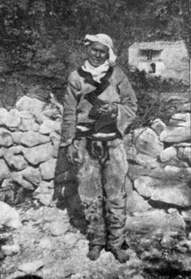Burrnesha

For much of human history, across cultures, women were often considered second class citizens, if not the property of the men in their household. History is full of examples, but one in particular stands out. In the 15th century, an Albanian prince called Leke Dukagjini codified the long-standing traditions of the region into a set of rules called the Kanun. The Kanun — a secular set of laws which applied to both Christians and Muslims (and others) in the region — set the standards for interpersonal conduct in the area. Under these rules, society was focused on household units under the dominion of the men, be they fathers or husbands. The women of the household were roughly considered to be the property of these men. Daughters were “owned” by their fathers, until such time that they were married off to their future husbands (and dictated by their father). After marriage, the young woman would join her husband’s household, ostensibly as his property.
But again, this wasn’t unique to the Kanun or Albania. What makes Albania special is that the Kanun gives women a way out. They can become burrnesha, or sworn virgins. And sometimes, it isn’t their choice.
The option of becoming a burrnesha is open to all women in these communities, but often, the decision is made for them (and at a young age) by their families. As the Guardian reported, the woman takes an oath, traditionally in a ceremony in front of a dozen of the village’s (male) elders, vowing to remain celibate for the rest of her life. In doing so, she becomes a man in the eyes of society and dresses as a male would (which apparently includes the right to wear a watch). One such example, seen above, comes from the early 1900s and is therefore of low quality, and the woman’s male garb is out of date, but note the white cap — that’s a headdress traditionally reserved for men. (More recent examples can be seen in a photo gallery here. Note the white skullcap in the final picture.) Women who take the oath are also able to own property, drink, smoke, carry a gun, and perform music. The other men in the community accept these de jure males as biological ones, as burrneshas are welcome to socialize with other men as if they were born that way.
But typically, women don’t take the celibacy oath simply because they want to be treated equal to their male counterparts (the no sex stuff notwithstanding). In general, the burrnesha can act as head of household, which allowed one woman named Pashe Keqi to care for her family. Keqi, per the Sydney Morning Herald, took the oath at age 20 because her four brothers were victims of the communists ruling Albania at the time (all four were killed or imprisoned), leaving Keqi, her mother, her four sisters-in-law, and their children without an income earner. But that requirement is waning, even in the most traditional areas of Albania. More modern social mores have come to the region, and women-as-men are becoming a thing of the past.
Bonus fact: Like many other nations, Albania is officially a secular nation with no official religion. (And to reiterate, the Kanun is a secular rules set.) But from 1967 to 1991, Albania, then under communist rule, went one further, effectively outlawing the practice of any religion whatsoever within its borders. During that time period, Article 37 of the Albanian constitution read: “The state recognizes no religion whatever and supports atheist propaganda for the purpose of inculcating the scientific materialist world outlook in people.” As Wikipedia notes, “the Albanian authorities began a violent campaign to try to eliminate religious life in Albania. Despite complaints, even by APL members, all churches, mosques, monasteries, and other religious institutions were either closed down or converted into warehouses, gymnasiums, or workshops by the end of 1967. By May 1967, religious institutions had been forced to relinquish all 2,169 churches, mosques, cloisters, and shrines in Albania, many of which were converted into cultural centers for young people.” Albania, to a meaningful degree, was (during that period) the world’s first officially atheist nation.
From the Archives: Dora the Defrauder: A world record high jumper who was more than what she let on. (The bonus fact on that one is particularly popular, too.)
Related: “Kanuni I Leke Dukagjinit: The Code of Leke Dukagjini,” the complete code, at 269 pages.
